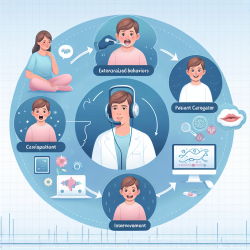Unlocking the Power of Genome Policy in Speech-Language Pathology
The intersection of genomics and policy presents a unique opportunity for practitioners in speech-language pathology, especially those involved in online therapy services. The research article "Defining the Spectrum of Genome Policy" by Haga and Willard (2006) provides a comprehensive overview of the current landscape and the implications for practice. This blog explores how practitioners can leverage these insights to enhance their skills and improve outcomes for children.
Understanding the Spectrum of Genome Policy
The article identifies five main areas of genome policy: research, legal, economic, educational, and acceptance and implementation issues. Each of these areas presents challenges and opportunities that can influence the practice of speech-language pathology.
- Research Issues: Prioritization and funding of research are crucial. Practitioners can advocate for research that directly impacts speech-language pathology, ensuring that emerging genomic technologies are tailored to the needs of children with communication disorders.
- Legal Issues: Intellectual property and genetic discrimination are key concerns. Understanding these issues can help practitioners navigate the ethical landscape of genomic data usage, ensuring that patient rights are protected.
- Economic Issues: The cost-effectiveness of genomic applications is a significant factor. Practitioners should stay informed about reimbursement policies and advocate for coverage of genomic-based interventions that demonstrate clinical utility.
- Educational Issues: Continuous education is vital. Practitioners should seek opportunities to enhance their understanding of genomics and its implications for therapy, ensuring they can effectively communicate these concepts to clients and their families.
- Acceptance and Implementation: The successful adoption of genomic applications depends on demonstrating safety and effectiveness. Practitioners can play a role in educating stakeholders about the benefits of genomic interventions in speech-language pathology.
Implementing Genome Policy Insights in Practice
To effectively integrate the outcomes of genome policy research into practice, practitioners should consider the following strategies:
- Engage with Stakeholders: Collaborate with researchers, policymakers, and educators to ensure that speech-language pathology is represented in genome policy discussions.
- Advocate for Ethical Practices: Stay informed about legal and ethical considerations in genomics, and advocate for policies that protect the rights of children and families.
- Promote Education: Participate in professional development opportunities focused on genomics, and incorporate these insights into therapy sessions to empower families with knowledge.
- Utilize Data-Driven Decisions: Leverage genomic data to inform therapy decisions, ensuring that interventions are personalized and evidence-based.
Conclusion
Genome policy has the potential to revolutionize the field of speech-language pathology, offering new tools and insights for practitioners. By understanding and implementing the outcomes of research in this area, practitioners can enhance their skills and improve outcomes for children. To read the original research paper, please follow this link: Defining the Spectrum of Genome Policy.










